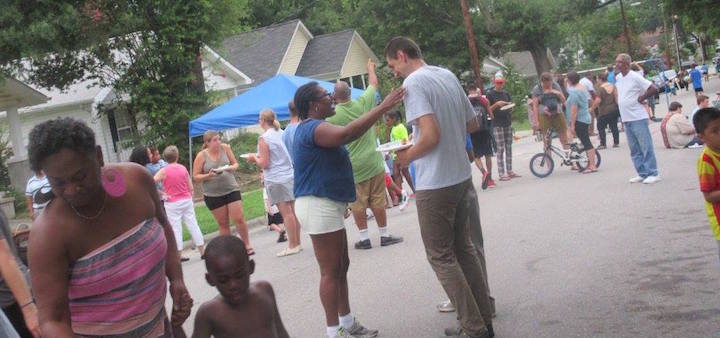On Tuesday evening this week, the Walltown community was out for this summer’s last block party. The storm that threatened to send us all running for our porches held off, providing cloud cover and a gentle breeze. The DJ mixed 70s funk with 90s hip-hop while old heads danced with kids in the street and new neighbors heard some of the stories that make this place.
A single mother who was homeless a decade ago told me about how the Ivy League schools are courting her son, who just got home from Governor’s School.
A fellow who used to hang out on the corner—who’s been locked up more times than I can count—chatted it up with Durham’s new police chief when she stopped by for a hot dog.
A couple of folks told me about a cousin’s funeral earlier that day, and I caught up with a neighbor who runs a program to close the achievement gap in our public schools.
I met a young woman who just moved to the neighborhood, then greeted a mother whose son will never get out of prison and knelt to say hi to his daughter, who stayed close to grandma’s side.
Back home after the rain had started, I thought about all the stories that make this place while I was getting our kids ready for bed. I remembered how, a few weeks ago, my six year old walked the two blocks from the church to our house and had three neighbors stop her to make sure she was alright (mom was on the other end and knew she was coming). All three of these neighbors talked to me from their porches when I covered the same ground some thirty minutes later. And each had their own commentary about kids and independence and how that girl looks more like her momma everyday.
Along that route of neighbors who make our business their own, a house has been for sale this summer. It’s just across from the house that George Wall built 120 years ago, when this place was a quiet grove north of Trinity College’s campus. It’s a new build, and it was built with ambition. After they finished the custom crown molding and rolled out the sod, it went on the market for over half a million dollars. I stopped to read the real estate sign myself, and listened to the hum of the next-door neighbor’s window unit.
People who seem to know what they’re talking about call this “gentrification.” People with access to capital want to live in our cities, so the market value of homes in our neighborhood have quadrupled in a decade. This is supposed to be good news for homeowners. We now have what the bank calls “home equity.”
But at what cost? Pervis had to move out of his duplex when the landlord decided to “fix it up” after 25 years. The rent tripled, but the landlord didn’t have trouble finding a new renter. Roy moved out of his duplex and they sent a backhoe to knock the thing down. When they same folks offered a neighbor across the street $150K to do the same to his family home, he told them to get the h%&* off his property.
For folks who’ve lived here for generations, this so-called gentrification feels like a re-colonization of America. People with papers that say they own the land are dislocating those who know the stories of this place, those who have called this place their home for generations. Sometimes, these new homeowners worry that their property is not secure, that their children are not safe.
They call the police, and the police respond, armed and ready to defend.
And I wish there were some way to tell them how safe my six-year old is under the watchful eye of half a dozen nosy neighbors. I wish there were some way to communicate how there’s always been enough for everyone here as long as folks have shared what they have—how you don’t need a security system if you know your neighbors.
I wish there were some way to measure community equity—the precious value of what we came together to celebrate on Tuesday night, of what we will soon lose if we can’t find a way to reimagine what it means to be neighbors in this place.

